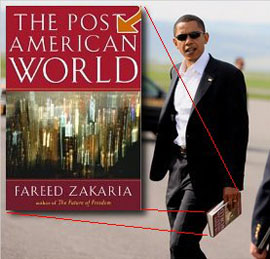Obama’s Canadianized Syria policy .. a military strike if necessary but not necessarily a military strike
Sep 16th, 2013 | By L. Frank Bunting | Category: In Brief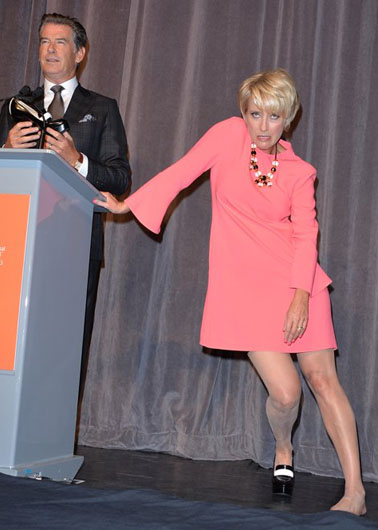
This photo of Pierce Brosnan and Emma Thompson at the Toronto International Film Festival of course has nothing to do with President Obama’s Syria policy directly. But it does seem to capture something of the mood in the wider global village over the week of September 9—13, 2013.
I can’t be the only person seriously irritated by Margaret Wente’s Toronto Globe and Mail column this past weekend – on “Barack Obama, the 98-pound weakling.” And the same thing goes for recent similar comments by Rex Murphy on CBC TV, and other like-minded true northern pundits.
In Ms Wente’s case you could say it’s just a game she plays, and if you’re dumb enough to fall for it you deserve what you get. She is a clever lady, no doubt. I think she deliberately says things that she knows will irritate people like me, to boost her readership. This time I tried to resist the provocative headline for a while. But I finally did read the thing. Maybe, I thought, her point is that President Obama is NOT a “98-pound weakling” and her article is ironic. But that proved wrong. (Really : how dumb can I be, etc, etc … )
Falling for Ms Wente’s “Barack Obama, the 98-pound weakling” is even more embarrassing, because she has such a strong track record of being almost consistently wrong about US foreign policy. (This may partly be because, unlike Senator Ted Cruz, she was actually born in the USAÂ – in Evanston, Illinois in 1950 – and only moved to the Toronto suburb of Don Mills in 1964, when she was 14 years old.)
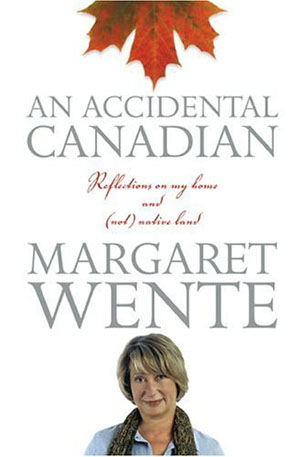 Almost exactly five years ago now, eg, the journalism critic Deborah Jones documented some especially egregious US foreign policy errors in a piece called “Accountability and Margaret Wente.” Jones wrote that “after 9/11 Wente was perhaps the biggest champion in Canada of President George W. (‘bring ’em on’) Bush.” And Jones cited several columns in which Ms Wente took strong positions of this sort, that she later felt obliged to disavow herself.
Almost exactly five years ago now, eg, the journalism critic Deborah Jones documented some especially egregious US foreign policy errors in a piece called “Accountability and Margaret Wente.” Jones wrote that “after 9/11 Wente was perhaps the biggest champion in Canada of President George W. (‘bring ’em on’) Bush.” And Jones cited several columns in which Ms Wente took strong positions of this sort, that she later felt obliged to disavow herself.
And then, Ms Jones explained: “Even after 2004, when the lies about WMDs had been revealed and the extent of the Iraq debacle and the truth of Bush as an ‘idealist’ was already clear Wente wrote a column, ‘What if there had been no war?’ in which she conceded ‘The hawks have their tail feathers between their legs these days,’ explained that ‘Friends of mine ridicule me mercilessly for swallowing that hokum about WMDs,’ but then insisted, ‘What if there had been no war?’” (Any serious answer to that question in 2013 would only ridicule Ms Wente even more.)
What I find most distressing about all negative Canadian comment on Barack Obama’s current Syria policy, however, is that it blatantly overlooks the striking extent to which, here as elsewhere, the current US president behaves a lot like a traditional Canadian politician.
* * * *
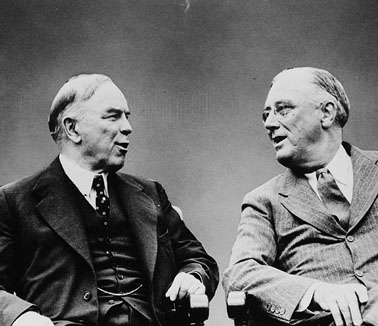
W.L. Mackenzie King and Franklin Roosevelt at Quebec City in the summer of 1943, during the Second World War.
Here I should stress that I am talking about the kind of Canadian politician epitomized by the likes of William Lyon Mackenzie King, Liberal Prime Minister of Canada, 1921—1926, 1926—1930, 1935—1948, and William Grenville Davis, Progressive Conservative Premier of Ontario, 1971—1984.
Prime Minister Stephen Harper today has sometimes shown that he does understand the compelling logic of the Mackenzie King Model in Canada’s uniquely diverse northern North American federation. But PM Harper’s essential instincts are more like those of former US President George W. Bush.
In any case, the most illuminating recent commentary on Barack Obama’s Syria policy that I have come across is Scott Horsley’s article, “In Syria Debate, Obama’s Internal Dialogue Becomes Audible,” on the National Public Radio website.
Reporting on President Obama’s TV address this past Tuesday night, Horsley writes : “In trying to justify a military strike, it was almost as though the president was arguing with himself about why a chemical attack warranted involvement in a war he’d studiously avoided for more than two years. Presidential historian Michael Beschloss says Obama’s speeches are unusual in the way they reveal his sometimes messy internal dialogue … ‘He is not afraid to confess that there is ambiguity in the world,’ Beschloss says. ‘And sometimes there may be ambivalence in his own mind, and it is not an accident that a president with these qualities was elected after two terms of a president who was famously very self-certain in most of the things he said in public’ … Beschloss says Obama’s ambivalence was especially apparent two weeks ago, when the president announced his decision that the U.S. should strike Syria, then added in the very next breath that he planned to seek authorization from Congress first.”
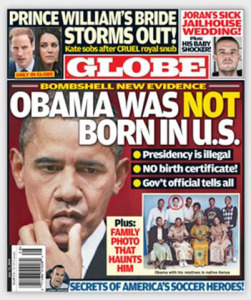
Some favourite reading of Donald Trump. And note that Senator Ted Cruz really was NOT born in the USA. He was born in Canada!
There are many in the United States (and Canada?) who find this audibility of President Obama’s internal dialogue unsettling – or worse. Even a fundamentally favourable report in USA Today, on the ultimate American-Russian-brokered deal to get chemical weapons out of Syria, opined that : “First take: For Obama, Syria deal a win on substance if not style …Â ‘Obama is a winner on this substantively, but the optics on this are bad,’ said Jim Walsh, an expert on international security at the Massachusetts Institute of Technology’s security studies program. ‘Syria doesn’t get bombed, and Assad is happy about that. The Russians are winners because they look like they are birthing a diplomatic solution to what was going to be another war in the Middle East … Obama is not going to get credit for this because of his critics at home, but on the substance it is a win,’ Walsh added … After the last two weeks, the White House will take it.

 US Secretary of State John Kerry and his Russian counterpart Sergei Lavrov. Time will tell whether their surprising but welcome deal will resolve the chemical weapons issue in Syria effectively. But as the New York Post has explained : “Obama plans strike if new Syria deal fails.”
It is worth noting as well, I think, that last week, before the final US-Russian Syria deal was done, Neil Macdonald at the CBC was saying : “Already, Russia is objecting to any binding Security Council resolution, and demanding that Obama publicly abjure the use of force as a precondition.” In the end there was no binding Security Council resolution. But both President Obama and Secretary of State John Kerry are saying that if progress on getting chemical weapons out of Syria does not progress, the US (and President Obama himself) is ready to use a military strike to remove some cobwebs, etc, etc. (And thus the New York Post finally reported “Obama plans strike if new Syria deal fails.”)

So far as we know, international actress Penelope Cruz is not related to Ted Cruz from Canada. But who would you rather see a picture of?
If we knew our own history in Canada better than we do nowadays, something about all this would sound familiar. Take the ultimate summary of Mackenzie King’s approach to political life, in a country with “too much geography,” two official languages, and a host of related regional and cultural cleavages, from coast to coast to coast. The summary was all about King’s policy on “conscription” or compulsory military service in the Second World War – something that was staunchly opposed in French-speaking Quebec (where King found a lot of his votes at election time), but broadly favoured in the predominantly English-speaking rest of the country. King’s policy of artful democratic compromise, he declared to all who would listen, was “conscription if necessary, but not necessarily conscription.”
President Obama’s ultimate current policy on getting rid of chemical weapons in Syria might similarly be summarized as “a military strike if necessary, but not necessarily a military strike.”
And we Canadians should be able to appreciate the brilliance of all this better than most. Especially in what Fareed Zakaria called The Post-American World – in a book first published in the same year that Obama was first elected President of the United States. (“‘This is not a book about the decline of America, but rather about the rise of everyone else.’ So begins Fareed Zakaria’s blockbusting bestseller on the United States in the twenty-first century.”)
Or, wake up and smell the coffee Margaret Wente, Rex Murphy, and so forth, in both the United States and Canada. The world really is changing. And fortunately for all of us Barack Obama understands this at least a lot better than either you or that mission-accomplished commander-in-chief, Geogre W. Bush.
